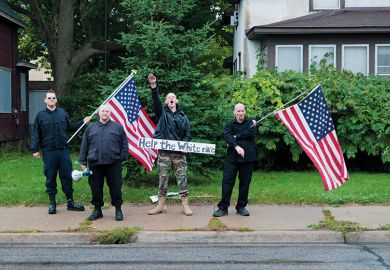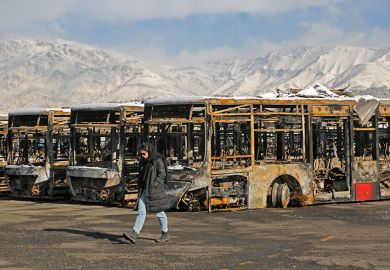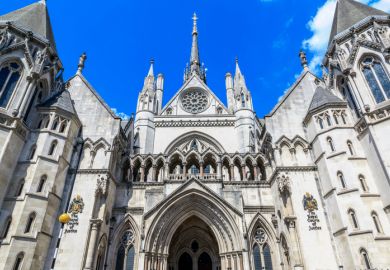Given that college campuses have been central to activism by the so-called alt-right, is it time for a campus-based counter-movement? Scholars behind the proposed Campus Antifascist Network, or Can, think so.
“The election of Donald Trump has emboldened fascist and white nationalist groups nationwide, on campus and off, and their recent upsurge requires antifascists to take up the call to action once again,” reads an invitation to join the group, posted on social media this week by David Palumbo-Liu, the Louise Hewlett Nixon professor and professor of comparative literature at Stanford University.
“As we wrote this letter,” it says, “hundreds of torch-bearing white supremacists were marching on the campus of University of Virginia chanting ‘Jews will not replace us’ and other vile slurs. An antifascist activist was murdered by these same forces in Charlottesville, raising the stakes of resistance to new heights.”
Network co-organiser Bill Mullen, a professor of American studies at Purdue University, on Wednesday called Can a “big tent” that “welcomes anyone committed to fighting fascism”.
“We are diverse in our political points of view but unified by our fight against fascism,” he said. The idea is “to drive racists off campuses and to protect the most vulnerable from fascist attack”.
And of objections made by some that Trump is not a fascist? Professor Palumbo-Liu said that is “literally an academic argument in the worst sense of the word. We need to pay attention to what is happening, not the labels that we feel are most fitting.”
Professor Mullen said the network started with about 40 members concerned about alt-right campus activity and the recent set of death threats against professors – many of them women and minorities – who have spoken out publicly against racism.
Since Charlottesville, the network has jumped to 200 members and 1,000 followers on its Facebook page, Professor Mullen said. Anti-fascist branches are being formed on campuses and the group is preparing teach-ins and self-defence materials for faculty and students who may meet with white supremacist protesters.
The network has been endorsed by writers Junot Díaz and Viet Nguyen, as well as graduate student unions. In addition to faculty members, graduate students and some undergraduates have joined.
Network members across the country already have expressed their solidarity with Charlottesville counterprotesters and published an open-access syllabus on fascism for educators. They’re asking other interested parties to support or join Can, and offering to help organise local antifascist chapters. Such chapters will “support, educate and defend faculty, students and staff, and share information on fascist organising in the US, planned fascist activities and organised anti-fascist responses,” they say.
Professor Palumbo-Liu said that the political right has framed the issue of alt-right provocateurs, neo-Nazis and white supremacists being allowed on campus as a simple matter of free speech. And if all they did was talk, that would be their right, he said. Instead, Can is worried about such activists’ “propensity to physical violence, aggressive confrontation and provocation, and violations of others’ civil rights”.
Antifascist activism against ethno-nationalism and general racism dates to early 20th-century Europe. But its shorthand, “antifa”, has become part of mainstream American political discussions since the rise of the alt-right – and as white supremacist groups began to support Trump’s candidacy.
While experts say that antifa organising is mostly nonviolent, the movement sees violence against those racists who would hurt others as ethically justifiable. Case in point: the antifa protests at the University of California, Berkeley, in February, ahead of a talk by then Breitbart editor Milo Yiannopoulos. Protesters – largely unaffiliated with the university – lit fires and threw rocks at police, drawing widespread condemnation from the right and a tweet from Trump threatening to cut off Berkeley's funding.
Even many on the political left criticised the antifa tactics on campus, noting that the damage was fixed and paid for by Berkeley, not Mr Yiannopoulos.
Of Mr Yiannopoulos, Professor Palumbo-Liu said that he’d come to Berkeley promising to reveal the identities of undocumented students – leaving them potentially vulnerable to all kinds of danger. And prior to that, he said, an anti-Yiannopoulos protester was shot ahead of his appearance at the University of Washington.
Professor Mullen said Can’s approach to protests will be to protect those most vulnerable to attack and “to build large, unified demonstrations against fascists on campuses when they come”.
Asked specifically about the possible use of violence, Professor Palumbo-Liu said antifa activists include those whose tactics Can would reject. “We would advocate self-defence and defence in various forms of those who are being threatened by fascists, but not violence,” he added, saying his group can’t control the antifa label or who ascribes to it.
Labels aside, Professor Mullen said “shying away” is the wrong approach. The alt-right has already tried to claim university campuses as recruiting grounds, he said, recalling that his own campus was covered with racist, neo-Nazi posters in November by the group American Vanguard. Identity Evropa has stated it is specifically targeting college and college-educated men as the future leaders of the movement.
This is an edited version of an article which first appeared on Inside Higher Ed.
Register to continue
Why register?
- Registration is free and only takes a moment
- Once registered, you can read 3 articles a month
- Sign up for our newsletter
Subscribe
Or subscribe for unlimited access to:
- Unlimited access to news, views, insights & reviews
- Digital editions
- Digital access to THE’s university and college rankings analysis
Already registered or a current subscriber?







